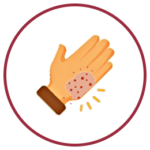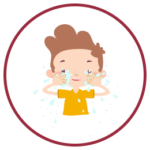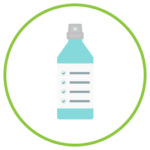Dear Reader,
Welcome to part 5 of the program and it’s time to focus in on the skin itself and we start by finding way’s to reduce irritation.
Why Irritation Needs to Be Addressed
Various inflammatory skin conditions, including seborrheic dermatitis, are accompanied by overall skin sensitivity. This heightened sensitivity increases the chances of symptoms worsening due to even the slightest irritation by external factors.
These external factors can come in a variety of forms:
- Temperature and humidity changes
- Abrasive physical contact
- Exposure to harsh cleansing agents
- Environmental pollutants
Understanding these (and other) possible sources of irritation and what you can do to reduce their negative effects, can go a long way to stabilizing your symptoms and reducing the amount of flare ups.
Expected Outcomes
By eliminating external sources of irritation you should notice:
- Reduced skin sensitivity and local inflammation
- Improved skin barrier stability
Objectives in Focus
Reducing skin irritation does not necessarily have to be restricted to the objectives presented in the module. The ones presented are one’s that I’ve found to be the most common, however, taking the time to think about possible sources of irritation in your own individual case may prove to be even more rewarding.
Utilize
Eliminate

Physical Interaction
Repetitive interaction with the skin can lead to further damage of the skin barrier, lead to secondary infection and prevent the healing process. Controlling these behaviors is essential for restoring healthy skin.

Known Irritants
Many skin care products contain ingredients known to cause irritation and skin barrier disruption. Reducing exposure to these ingredients can give the skin a chance to repair and restore it's natural barrier stability.

Excessive Cleaning
Over washing and cleansing of the skin can degrade the skin's natural barrier function, reduce it's moisture holding ability and result in negative alterations in the skin flora. Reducing the frequency and amount of cleansing agents used can help soften the blow and give the skin a chance to repair.

Soap
Regular use of soap can drastically raise skin surface pH and lead to further worsening of skin barrier abnormalities. Reducing soap usage on sensative/irritated skin can aid normal barrier recovery, reduce unwanted inflamattion and allow for more stable skin repair.
Example Daily Checklist
- Avoid excessive cleaning of the skin
- Avoid using regular soap on sebum rich skin
Regular soap can drastically increase skin surface pH levels. Many experts recommend staying away from regular usage, especially in the case of sensitive and/or damaged skin. - Reduce the use of known irritants
- Minimize physical interaction (touching, scratching)
Press forward. Do not stop, do not linger in your journey, but strive for the mark set before you – George Whitefield


 Getting Started
Getting Started Improving Digestion
Improving Digestion Achieving Dietary Balance
Achieving Dietary Balance Controlling Stress and Anxiety
Controlling Stress and Anxiety Lifestyle Adjustments
Lifestyle Adjustments Reducing Irritation
Reducing Irritation Improving Barrier Function
Improving Barrier Function